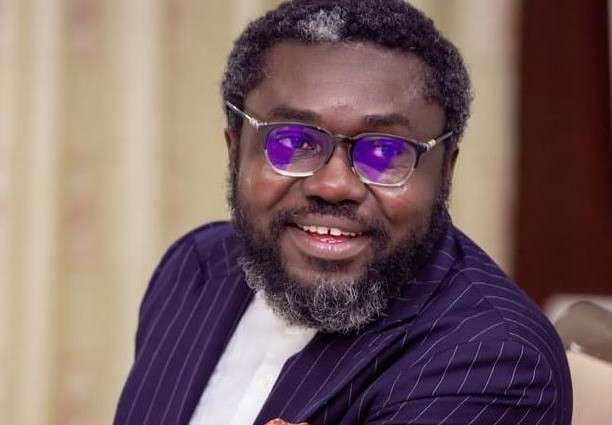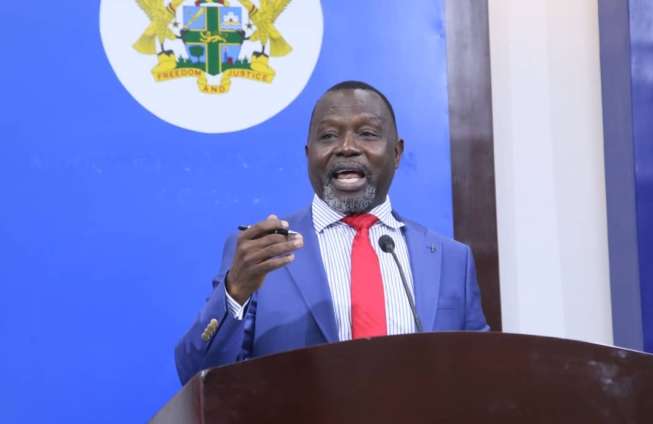Renowned legal practitioner and constitutional activist Osagyefo Mawuse Oliver Barker-Vormawor has hailed Ghana’s Attorney General and Minister of Justice, Hon. Dr. Dominic Akuritinga Ayine, for ushering in a new era of prosecutorial accountability and criminal justice reform.
Barker Vormawor, in a detailed argument, described Dr Ayine’s bold declarations at a recent press conference as a historic ideological shift that prioritizes people-centred justice over entrenched legal formalism.
“These developments are deeply exciting, both in their immediate implications and in their potential for systemic change.
“The Presser reminded me first of the intellectualism of former AG NYB Adade; and also more importantly of the socio-legal engineering of the early PNDC years, that I felt compelled to write something about this. We may be on the cusp of something great.”
Osagyefo Mawuse Oliver Barker-Vormawor, Legal Practitioner and Constitutional Activist
According to Barker-Vormawor, Dr. Ayine’s announcement of a new approach to nolle prosequi, where he provided explanations for prosecutorial decisions, marks a departure from the long-standing norm that the Attorney-General is not obligated to justify such actions.
However, Barker-Vormawor argued that focusing solely on this procedural change would be a disservice to the deeper ideological transformation Dr Ayine has set in motion.
He pointed out that Dr Ayine’s assertion that the Attorney-General’s discretion is neither absolute nor immune to scrutiny represents a fundamental challenge to established judicial orthodoxy.
For Barker-Vormawor, Dr Ayine’s statement, “The traditional view that the Attorney-General owes no one an explanation, in my view, does not comport with the architecture of our Constitution, and I absolutely disagree with it,” directly confronts the Supreme Court’s historically minimalist stance on the issue.
According to Barker-Vormawor, this is a monumental departure from legal conservatism, as Dr Ayine is not merely introducing procedural reforms but reimagining the very foundation of constitutional governance.
“By invoking the ‘architecture of the Constitution’ instead of the traditional ‘text and spirit’ interpretation, Dr Ayine suggests a structured, logical framework where transparency and accountability are not just ideals but foundational principles”.
Osagyefo Mawuse Oliver Barker-Vormawor, Legal Practitioner and Constitutional Activist
Judicial Minimalism vs. Constitutional Transparency
According to Barker-Vormawor, a particularly groundbreaking element of Dr Ayine’s stance is his insistence that prosecutorial discretion must be subject to Article 296 of the Constitution, which mandates that discretionary power be exercised fairly, reasonably, and transparently.
This move in the view of Barker-Vormawor signals a major shift toward ensuring that legal decision-making processes are subject to checks and balances, reinforcing the rule of law rather than arbitrary prosecutorial power.
Barker-Vormawor emphasized that Dr Ayine’s position revitalizes Justice Gabriel Pwamang’s minority opinion on prosecutorial discretion, which has proven to be more aligned with modern democratic principles.
Pwamang had argued: “The decisions to prosecute and to terminate prosecution of suspected offenders is a matter of immense public interest. Furthermore, it affects the rights of the suspected offenders who may be compelled to suffer the indignation of prosecution when there is seriously no point in mounting prosecution on the facts of the case.”
By aligning himself with this view, Barker-Vormawor strongly posited that Dr Ayine advocates for a system where prosecutorial decisions—affecting fundamental liberties—must be transparent and subject to public justification.

Ending Arbitrary Arrests and Charges
Perhaps one of the most consequential aspects of Dr Ayine’s remarks according to Barker-Vormawor was his critique of Ghana’s current pretrial procedures.
Dr Ayine’s emphatic declaration: “I do not believe in arresting and charging a person before going to look for evidence.” struck Barker-Vormawor, with him expressing admiration for the AG’s view.
Barker-Vormawor strongly posited that the simple yet radical statement challenges the modus operandi of Ghana’s law enforcement agencies, where police routinely arrest individuals without clear distinctions between persons of interest and suspects.
He pointed out that under the current system, suspects are often charged and compelled to write caution statements before any meaningful investigation takes place.
“A proper legal process should follow a simple order: investigate first, then charge; if there isn’t sufficient evidence to sustain a charge, do not arrest; once a charge is laid, it should mean that the police are ready to proceed to trial, not that they are still looking for evidence.
“Instead, the prevailing system reverses this logic: police arrest first, charge immediately, and only then begin gathering evidence. This leads to countless innocent individuals being remanded into custody for indefinite periods, often simply because the police have yet to complete their investigations”.
Osagyefo Mawuse Oliver Barker-Vormawor, Legal Practitioner and Constitutional Activist
For many, this results in an endless cycle of remand renewals, particularly for those without legal representation with Barker-Vormawor decrying that some detainees spend years in pretrial detention despite the absence of any compelling evidence against them.
The Path to Systemic Change
To address these systemic injustices, Barker-Vormawor pointed out that Dr Ayine’s vision calls for sweeping legislative interventions aimed at curbing prosecutorial and police abuses.
Key proposals include: setting a statutory threshold for charges, ensuring that arrests and prosecutions are based on substantial evidence, not mere suspicion and reforming remand procedures to preventing the use of pretrial detention as a tool for incomplete investigations.
Barker-Vormawor further called for mandating prosecutorial transparency, requiring public disclosure of the reasoning behind critical legal decisions.
He also called for judicial oversight on remand renewals to train judges to prevent automatic approvals of police remand requests without proper justification.
These reforms according to Barker-Vormawor if properly implemented could significantly reduce wrongful detentions and ensure that individuals are not unfairly deprived of their freedom.
Barker-Vormawor sees Dr. Ayine’s approach as a turning point for Ghana’s legal landscape asserting that Dr Ayine’s decision to challenge entrenched judicial precedents, redefine prosecutorial discretion, and advocate for legislative reforms signals a bold commitment to justice that aligns with constitutional democracy.
“This moment should not be taken lightly. It is not just about changing how nolle prosequi is applied—it is about a philosophical shift in how justice is conceived and delivered. And that is why it is profoundly exciting.”
Osagyefo Mawuse Oliver Barker-Vormawor, Legal Practitioner and Constitutional Activist
With Justice Sai as his able deputy, Barker-Vormawor believes Dr Ayine has the opportunity to champion a purposeful era of criminal justice reform—one that ensures justice is not just dispensed but done so in a manner that upholds fairness, accountability, and the rights of every citizen.
According to Barker-Vormawor, Dr Ayine’s vision is reminiscent of the socio-legal engineering of the early PNDC years, a period characterized by radical justice reforms.
This time, however, it must be the era of social-democratic justice, where legal principles evolve to serve the people, not just the system, and for that, Barker Vormawor declared, “I am here for it!”
READ ALSO: World Bank Cautions Ghana: Premature Return to Capital Markets Could Be Risky




















